Recruitment Training for Managers
Effective management will empower your teams and boost revenue
ELEVATE’S RECRUITMENT TRAINING FOR MANAGERS SERVICES
Our ‘Recruitment Leadership Training Program’ is suitable for rising stars in your leadership pipeline through to billing managers with up to 5 years’ experience. This highly engaging and interactive program will help your leaders understand how to get the best out of their team, keep people motivated and achieving, and help them prioritise their time to ensure their own numbers stay consistent.
What’s involved?
- Attendees will explore leadership concepts that move them away from behaviours that diminish influence and into confident leadership that empowers their team to grow and be their best
- They will contribute ideas, ask questions and problem solve with the group, learning from each other’s experience whilst being positively challenged by new ideas
- The sessions are designed to maximise interaction with the material to improve participants’ recall, retention and implementation
- Training is held over a 2 day workshop in-house or eight 90 minute sessions
Topics covered:
Day 1: Leading Self
- Developing self-awareness: Understanding strengths and blind spots to become intentional about how we lead and show up
- Defining your leadership brand: Recognising and designing what we want to be known for as a leader, and how to put it into practice
- Managing time and energy: Knowing what fuels and drains us to effectively manage our time
Day 2: Leading Others
- Effective delegation: Delegation to get time back, to help others grow and to increase their engagement through taking on new challenges
- Giving and receiving feedback: Utilising feedback as an effective tool for creating change, and learning how to ask for it to fuel our own growth
- Coaching for performance: A process to empower individuals to grow through asking purposeful questions that allow them to find meaningful answers, in turn freeing up our time
Our Recruitment Training for Managers Fundamentals
The Best Managers Fundamentals
CUSTOMER SERVICE
Our trainers at Elevate are also its owners which means they are fully committed to getting results, otherwise the business falls over. And besides, we get a thrill watching you thrive. But this set up also breeds the personal service we are renowned for.
EXPERIENCE
Our workshops are not heavy, theory-based slogs. They are learnings born from our real-life experience in the recruitment industry. They are authentic, they are practical and they work.
FOLLOW UP
We do not desert our clients as soon as the workshop is over. We pride ourselves on our continued support and always see a better ROI when we return to businesses for follow up coaching after the initial training wraps up.
DESIGNED FOR YOU
We understand every recruitment agency is different, with it’s own set of hurdles. That is why we will tailor our training for your managers specifically targeting your specific areas of need. There are no standard, ‘off the shelf’ workshops here.
TOP DOWN APPROACH
We have a proven track record of working with all levels of a business, from the CEO all the way down, to ensure buy in from everyone. It is this wholistic approach that achieves the best results of any training program.
CULTURE CHANGE
So much of the success you will see will come from our ability to instil a cultural shift in your agency. We encourage and teach how to develop a culture of feedback and open communication which will transform your business.
Managing a full desk recruitment team starts with getting the right people on your team. If you get that right, the rest will follow. If you don’t, it may be impossible to deliver on your objectives.
WHAT OUR ATTENDEES SAY
Testimonials
Want to know more about how Elevate can help your team improve performance, create better outcomes and find more fulfilment in their roles?













